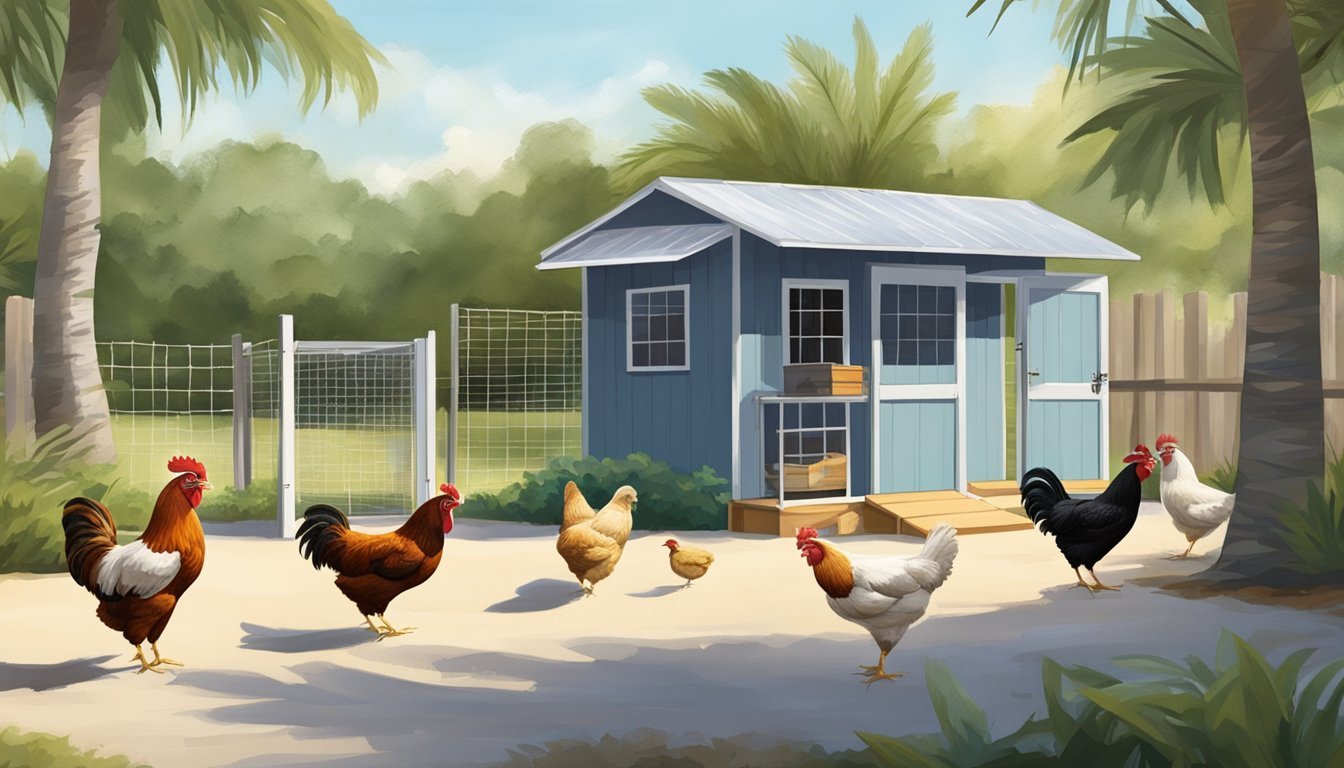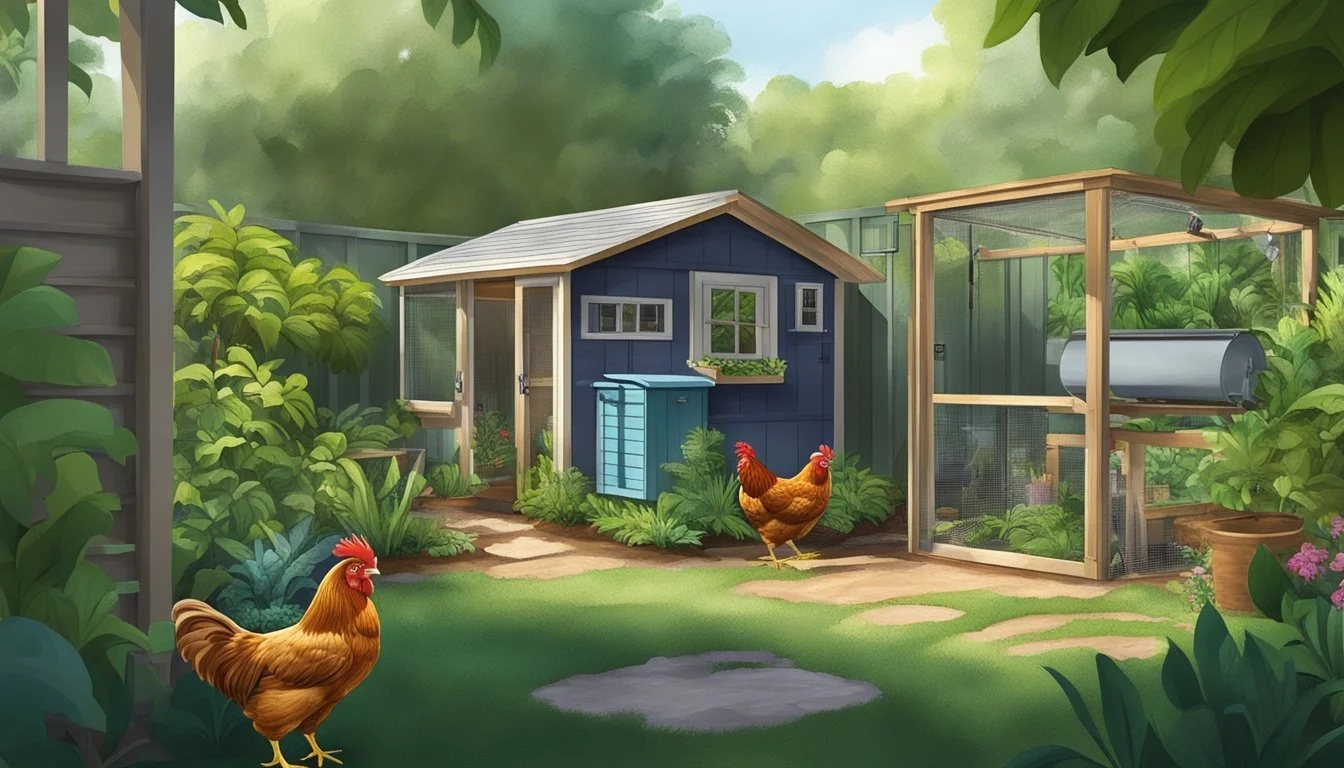Keeping Backyard Chickens in Hollywood, FL
Essential Tips for Urban Poultry Farming
Backyard chicken keeping has become an increasingly popular pursuit for many residents in urban and suburban areas, including those in Hollywood, Florida. The practice offers a multitude of benefits, such as providing fresh eggs, natural pest control, and the enjoyment of the birds' presence as pets. However, prospective chicken owners in Hollywood need to navigate a set of local regulations that govern the keeping of chickens to ensure they are in compliance with city ordinances.
It is crucial for Hollywood residents to understand that, while some Florida municipalities are chicken-friendly, local laws can greatly vary and may be subject to change. Detailed guidelines and restrictions about the number of chickens allowed, the need for permits, coop specifications, and other relevant regulations must be carefully reviewed before one decides to start raising chickens in their backyard.
To assess the feasibility of keeping backyard chickens in Hollywood, FL, interested individuals should consult with local government or planning agencies. This due diligence is necessary because, despite Florida's generally favorable climate for poultry-rearing, adherence to specific conditions is key to responsibly and legally engaging in this hobby. Residents may also benefit from joining local community groups or forums that can provide additional insight and first-hand experiences from fellow chicken enthusiasts in the area.
Understanding Local Ordinances
When keeping backyard chickens in Hollywood, FL, it is essential to be aware of and comply with the local ordinances to avoid penalties and ensure the welfare of the animals and the community.
Hollywood Municipal Code
The City of Hollywood has specific ordinances that regulate the keeping of chickens. Ordinance 2021-34 notes that individuals are prohibited from selling, bartering, or giving away baby chickens under six weeks of age, or rabbits under two months of age as pets or novelties. This is enforced to protect the welfare of young animals.
Permits and Zoning Requirements
In Hollywood, FL, the zoning laws dictate whether residents can keep chickens on their property. The city's code states that keeping fowl is generally prohibited except in areas where it was allowed prior to June 10, 1948. In these grandfathered areas, fowl can be kept continuously since before this date. A permit may be required to keep backyard chickens depending on the specific zoning regulations of the property.
Number of Chickens Allowed
Regulations specific to Broward County, within which Hollywood is located, stipulate certain limitations on the number of animals per property. For Rural and Estate districts, the code permits one animal per ten thousand square feet of plot area. However, this restriction does not extend to household pets as they are defined in a different article within the code.
Restrictions on Roosters and Other Fowl
While the ordinances for keeping chickens are laid out, specific mention of roosters is usually addressed in noise ordinance regulations. In many places, including Hollywood, FL, roosters may be restricted or prohibited due to their potential to create excessive noise, which could disturb the community. Regulations may also vary concerning other fowl, so it’s important to check the local laws.
Setting Up Your Coop
When establishing a coop for backyard chickens in Hollywood, FL, one should focus on the specific location within the property, adherence to local regulations, and ensuring the safety and hygiene of the chickens.
Choosing the Right Location
Selecting an appropriate site for a chicken coop hinges on several factors that include sunlight exposure, drainage, and ease of access. A well-drained area that receives ample sunlight and is easily accessible for feeding and cleaning is ideal. The coop should be placed away from property lines to meet local ordinances and avoid disturbances to neighbors.
Coop Design and Size
The design of a chicken coop must cater to the number of chickens being housed, providing adequate floor space for each bird. A standard recommendation is 2 to 3 square feet inside the coop per chicken, and about 8 to 10 square feet per chicken in the outside pen area. Good ventilation and insulation are also necessary to protect chickens from Florida's weather conditions.
Inside Coop: 2-3 sq ft/chicken
Outside Pen: 8-10 sq ft/chicken
Maintaining Cleanliness
For a clean coop environment, regular removal of waste and soiled bedding is imperative. A coop should have an easy-to-clean floor and secure storage for feed to prevent pests. Implementing a schedule for deep cleaning once a month helps maintain a healthy living space for backyard chickens.
Protection from Predators
A secure chicken coop and pen area are critical to protect chickens from predators. The coop should be fortified with predator-proof hardware cloth and secure locks. One should also consider a covered pen to safeguard against aerial predators.
Compliance with Property Regulations
To comply with local regulations, a detailed site plan may be required when constructing a coop. Regulations can include restrictions on the number of household pets and distance from neighboring homes. One should consult the Hollywood, FL municipal code or zoning laws to ensure compliance before constructing a coop on their property.
Selecting and Raising Chickens
When raising chickens in Hollywood, FL, one must consider the climate's impact on breed selection, proper feeding, watering practices, health monitoring, and egg production to ensure a thriving flock.
Chicken Breeds Suitable for Florida's Climate
Choosing the right breeds for Florida's hot and humid climate is crucial. Breeds such as the Leghorn, Rhode Island Red, and Plymouth Rock are known to tolerate heat well. Orpingtons are also a suitable choice; their fluffy feathers make them good layers and they are known for being hardy in various climates.
Feeding and Watering
Chickens require a consistent supply of fresh water and a balanced diet. In a table format:
Time of Day Feeding Guideline Watering Guideline Morning Provide a complete feed; check feeders Refill waterers with fresh water Afternoon Scatter grains for foraging Ensure waterers are not contaminated Evening Top up feeders if needed Check water levels; refill as needed
Monitoring Health and Preventing Disease
Regular health checks are essential to identify and prevent diseases. Signs of a healthy chicken include clear eyes, clean feathers, and regular laying patterns. Keep an environment that minimizes stress and overcrowding, as these can lead to immune suppression and disease susceptibility.
Egg Production and Collection
Egg production can be influenced by factors such as daylight, diet, and breed. Orpingtons, for example, can lay around 200 eggs per year. Daily collection of eggs is important to prevent breakage or pecking, and maintaining a clean nesting area ensures eggs are free from contaminants.
Legal Considerations for Chicken Owners
When it comes to keeping backyard chickens in Hollywood, FL, residents must navigate a complex landscape of state, county, and local regulations. Understanding these laws is essential for ensuring proper ownership and compliance.
Understanding State and County Regulations
In Florida, chicken owners must be aware of both state and local laws affecting their ability to keep poultry. The state provides overall guidelines, but each county may have its own specific ordinances. Hollywood, FL falls within Broward County, where county laws dictate the specifics of poultry keeping. For instance, certain areas may prohibit the keeping of fowl based on zoning regulations established as far back as 1948. Residents should check with the local government to determine if their area allows the keeping of chickens, and if so, what limitations or requirements are in place.
Ownership Rights and Responsibilities
Ownership of backyard chickens brings with it a series of rights and responsibilities. Owners must ensure proper care, housing, and waste management. Ordinances may specify the number of chickens allowed, enclosure specifications, and distance from neighboring properties. Proper disposal of chicken waste is mandated, with composting being a common method. It's crucial for owners to adhere to these rules to maintain a healthy environment and good relations with neighbors.
Number of Chickens: Regulations may limit the number of chickens that can be kept.
Enclosure Requirements: There are often specific requirements for coops and enclosures.
Waste Management: Owners must properly dispose of chicken waste, often through composting.
Navigating Slaughtering and Meat Production Laws
Slaughtering chickens and using them for meat production carry an additional set of legal considerations. Local laws may dictate whether residents can slaughter chickens on their property. Generally, the activity should be done in compliance with humane treatment laws and sanitation standards to prevent any public health issues. Individuals seeking to engage in meat production on a larger scale must adhere to state laws that regulate such practices, including obtaining necessary permits and undergoing regular inspections.
It's imperative for prospective and current chicken owners in Hollywood, FL, to familiarize themselves with both state and county laws to ensure they remain within legal boundaries while enjoying the benefits of backyard poultry-keeping.
Community Engagement and Considerations
In Hollywood, FL, the practice of keeping backyard chickens requires property owners and residents to address the concerns of noise and the need to educate the community on the benefits and responsibilities of urban poultry farming.
Dealing with Noise and Neighbors
Awareness: Property owners are responsible for managing the noise levels from chickens to avoid disturbing neighbors.
Guidelines: They must adhere to local guidelines that may dictate how many chickens are permitted and the distance coops should be from neighboring properties.
Strategies to Mitigate Noise:
Positioning of Coops: Place coops away from property lines to reduce noise impact.
Select Breeds Wisely: Opt for quieter chicken breeds.
Educating Family and Community on Backyard Chickens
Information Sharing: Property owners should educate their family, especially children, on how to care for chickens and understand community guidelines.
Community Outreach: Engaging in community discussions can help dispel misconceptions and emphasize the benefits of keeping chickens.
Educational Topics to Cover:
Benefits: Explain the ecological benefits, such as pest control and food waste reduction.
Responsibilities: Highlight the care and maintenance required for a healthy flock.
Environmental Impact and Sustainability
Raising backyard chickens in Hollywood, FL contributes to local sustainability efforts and impacts the environment through waste management and eco-friendly practices.
Waste Management and Composting
Backyard chickens are instrumental in waste minimization. They feed on kitchen scraps, effectively reducing the amount of organic waste that would otherwise end up in landfills. Beyond merely reducing waste, chickens also provide benefits for composting. Their waste is rich in nitrogen, phosphorus, and potassium, essential nutrients that enrich soil health. Homeowners can incorporate chicken manure into their compost bins, returning these nutrients to the earth and enhancing the fertility of their gardens.
Waste Minimization: Feeding kitchen scraps to chickens
Composting: Chicken manure as a nutrient-rich additive to compost
Promoting Eco-Friendly Practices
Keeping backyard chickens aligns seamlessly with eco-friendly practices. By localizing the production of eggs, Hollywood residents reduce the carbon footprint linked to the transport of eggs from commercial farms to grocery stores. Moreover, chickens contribute to pest control by eating insects, diminishing the need for chemical pesticides that can harm the surrounding environments.
Reduced Carbon Footprint: Local eggs mean less transport emissions
Natural Pest Control: Chickens eating insects reduces the use of harmful pesticides
Additional Resources and Information
For residents in Hollywood, FL looking to keep backyard chickens, there are valuable resources and educational opportunities to ensure proper care and legal compliance. These resources aim to guide newcomers and experienced poultry enthusiasts alike through the intricacies of backyard chicken keeping.
Local Workshops and Educational Opportunities
UF/IFAS Extension Orange County: They regularly offer workshops and events that cover a range of topics, including backyard poultry care. Residents can attend these to learn best practices in chicken keeping, coop construction, and maintenance.
University of Florida Institute of Food and Agricultural Sciences: This institute provides extensive online materials and local extension services offering research-based information on agriculture, including how to raise backyard chickens responsibly and sustainably.
Frequently Asked Questions
Are chickens allowed in Hollywood, FL?
It is essential to review local ordinances, as regulations can vary widely. The city code can be found at the official city website or contacting local authorities for the most current information.
What are the coop requirements in Hollywood, FL?
The Florida Building code mentions permits may be required for coops over 100 square feet. Further details on coop standards should be verified with local codes.
What support does UF/IFAS Extension provide for chicken owners?
They offer comprehensive guides on backyard chicken care, including proper feeding, coop building, and chicken health management.









